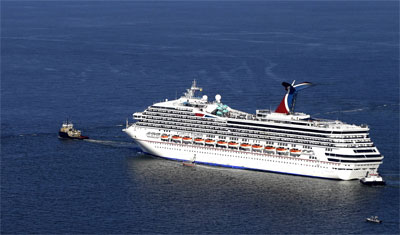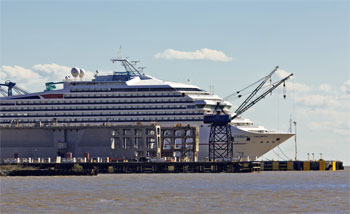Carnival Corp. and the rest of the cruise industry have promised to install additional emergency backup power aboard each ship, creating complex and expensive technical puzzles for marine engineers.
In the wake of the embarrassing Carnival Triumph blackout, Miami-based Carnival in April pledged to spend more than $300 million to upgrade power systems on all 24 of the company’s cruise ships. A month later, Cruise Lines International Association (CLIA) adopted a “Passenger Bill of Rights” that promises adequate emergency power in the event of a propulsion failure.
This year, most of the world’s cruise ships have undergone assessments to identify main- and backup-power-generation vulnerabilities, CLIA said. The technicians developed ship-by-ship solutions to reduce the risk of a wholesale power loss that would cripple propulsion and passenger-comfort systems.
Marine engineers said it’s not just a matter of finding space to install additional generators on board. The trickier — and necessary — corresponding refit requires additional switchboard and wiring capacity. Sometimes more fuel piping is necessary.
“You can put different generators around the ship in different places … but you have to duplicate the wiring of the ship,” said Hector Pazos, a Florida-based marine and mechanical engineer and maritime casualty analyst. “Technically and physically, it can be done. But it’s a lot of money.”
Cruise lines and regulators had presumed that the ships were already protected from total blackouts because the newest vessels have redundant, physically separated engine rooms that resist the ability of a fire to knock out all generators. A spate of total power failures in recent years has revealed that engine fires are penetrating switchboard and wiring systems with system-wide reach.
 |
|
Associated Press/Gerald Herbert |
|
Carnival Triumph is towed into Mobile Bay after its power failure in February. |
Assessors on each ship are examining how to add backup generation in the event of major power loss. They are also trying to recognize ways to prevent blackouts in the first place, said Bud Darr, CLIA’s director of technical and regulatory affairs.
“The assessments are identifying where vulnerabilities exist on existing ships,” Darr said. “They are evaluating the risk in the reliability and redundancy of the main power and the reliability and redundancy of guest comfort systems.”
Standard emergency systems normally are designed to ensure enough power to accomplish lifesaving activities only, said Andrew Coggins, a former chief engineer who is a cruise industry researcher at Pace University.
“The emergency diesel generator is going to lower the lifeboats or supply power to the fire pump or to the pumps to prevent flooding … and the emergency lighting and the communication system on the ship to send an SOS,” Coggins said. “It’s not going to supply power to the galley, main lighting, air conditioning or ventilation.”
Modern-day consumers, however, are less tolerant of inconveniences than they used to be. “If there is a fire and you lose propulsion, the passengers still expect to have food and still expect the toilets to work,” Coggins said.
Carnival Triumph, which drifted or was under tow for three days after a fire in February, went back into service in June. While undergoing repairs at Mobile, Ala., it was among the first ships to receive a power-system upgrade. Carnival Chief Executive Gerry Cahill said the improvements would both help prevent power losses and allow hotel services to operate in the event of a main-propulsion loss.
“Carnival is increasing the load that the diesel generators can carry so they can provide power to lighting and power for ventilation,” Coggins said. “Carnival wants to avoid a repeat of the Triumph (blackout), so you can look at it as an investment in the future. There will be the redundancy on the ships; they would maintain the public’s confidence.”
When ships receive additional backup generators, often they are installed up high, away from the main engine compartments.
“You put them on the upper decks, and you separate them from the main engines, and if they are on the upper decks they are not subject to flooding as happened with the Costa Concordia,” Coggins said.
In addition to the challenge of finding the space and perhaps sacrificing guest amenities, engineers must consider location of bulkheads and new ducts and pipes that were not figured into the original design of the ship.
“In some cases, the emergency generation is on the upper decks of the ship rather than down in the engine room,” Pazos said. “Then, of course, there is the problem with noise and the fuel and other practical matters of not having the generators close to the tanks that carry the fuel. You will have a lot more wiring and piping for the fuel.”
The linchpin ensuring the effectiveness of the additional generation is the wiring and switchboard systems. “Just adding additional capacity is not a lot of use if you haven’t added the electrical infrastructure,” Darr said.
“If you lose that wiring, of course you lose propulsion. If you lose the switchboard, you lose propulsion,” Coggins said. “So it’s having alternative switchboards and alternative wiring to carry the power. It’s expensive, but it can be done.”
While Carnival has announced a specific program, Pazos doesn’t believe most of the industry will choose to spend the money for significant system upgrades. Blackouts will still occur, he said.
“They may make some improvements, but I don’t think they’re going to do something that’s going to make a major difference to avoid these types of mishaps,” he said.
Darr said more than 80 percent of the world’s cruise-ship capacity had undergone their propulsion assessments by June. CLIA’s “Cruise Industry Passenger Bill of Rights” also promises that ship crews are properly trained in emergency and evacuation procedures.
Last year, the association began requiring training with fully loaded lifeboats, and an International Maritime Organization panel voted to require passenger safety musters upon departure.
“We have to talk to the general public about safety,” Darr said. “We have to make sure the general public understands that this is a priority for us.”

